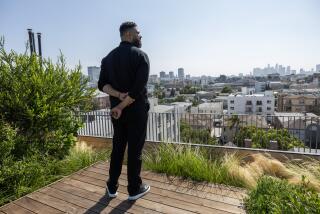Opinion: Jordan Downs -- a look inside an evolving urban village
Jordan Downs, the public housing development in Watts, is poised to be transformed into a dramatically different mixed-use, mixed-income complex. The existing 700-unit development will give way to twice as much housing along with a large retail center. Half of the units will be market-rate and affordable housing. The other half will be subsidized. All those who live there now — and there are 2,600 residents — are guaranteed units in the new Jordan Downs as long as they are in good standing. The idea is to have an urban village. But Jordan Downs is already an urban village.
On a recent morning, I got just a glimpse of that community. My guide was one of the most recognizable (seemed to me like everyone knew him) figures at Jordan Downs — Michael “Big Mike” Cummings, one of the founders of the much-praised Project Fatherhood group at Jordan Downs. Cummings owns a tow service and doesn’t live at Jordan Downs, but he is a fixture there.
Johnny “Reddy” Bailey, a youth minister and a former gang member who was a founder of the fathers group in Watts that eventually led to Project Fatherhood at the complex, is himself a study in reinvention.
“I used to gang-bang over here,” he told me. “I got shot in the face, lost an eye. Got stabbed in the back of my neck.” He spent 11 years in prison for bank robbery and he’s been out for about eight years. He comes from a line of preachers — both his father and grandfather were — but he took his own path back to spirituality.
Bailey, 42, doesn’t live at Jordan Downs but works with people there. “If you don’t rebuild the people, rebuilding the buildings is not going to do it,” he said.
Getting the funding for this $700-million project is a long process.
“You never start out with all your money lined up,” said Kimberly McKay, executive vice president of the nonprofit Bridge Housing, which specializes in affordable-housing projects. Bridge is one of two developers working on the housing portion of the new Jordan Downs.
Meanwhile, asks one person I met at Jordan Downs, why not do some interim fixes on the dilapidated buildings? “If it’s going to take two or three years, why not paint the buildings? Why not do a little beautification?”
Nykeema Roy, 35, has lived at Jordan Downs all her life. The redevelopment, she worries, will bring new restrictions. And already, she contends, some of the Los Angeles police assigned to Jordan Downs as part of a generally well-received community policing program have traded in warm outreach for hostile questioning — at least when it comes to two of her teenage sons. “My kids can’t even sit on the porch,” she said.
Roy, who is black, contends that police sometimes treat Latino residents differently from black residents. During a children’s party in her backyard recently, she said, the police showed up and told her to break up the party because the music was too loud. “They don’t mess with Latinos,” she said. “They could have a whole band.”
There has been a dramatic drop in homicides and gang violence at Jordan Downs in the last several years. There was no murder in the development for four years until a fatal shooting in March. That drop in crime is largely attributed to the community policing effort that is overseen by LAPD Sgt. Emada Tingirides.
“My job is to make sure that cultural policing is being carried out,” she told me the day before I visited Jordan Downs. “I just started recently using that term a lot. I’ve grown to understand that I need to educate myself on the history of this community, on the pain of this community, on the anger of this community.”
With that in mind, I suggested to Roy that she take her complaints about the police to Sgt. Tingirides.
Outside the Jordan Downs community center, Cummings and I ran into a man who identified himself only as Twin (“That’s my name, period,” he said) who does volunteer maintenance at the center. At 64, he has spent much of his life in and out of Jordan Downs, although he doesn’t live there now. During the Watts riots, his mother bundled up him and siblings and took them to an aunt’s house to stay away from the rioting. These days, he said, Jordan Downs is fairly quiet.
“There’s not been no drama over here in a while,” Twin said.
Follow the Opinion section on Twitter @latimesopinion
More to Read
A cure for the common opinion
Get thought-provoking perspectives with our weekly newsletter.
You may occasionally receive promotional content from the Los Angeles Times.











